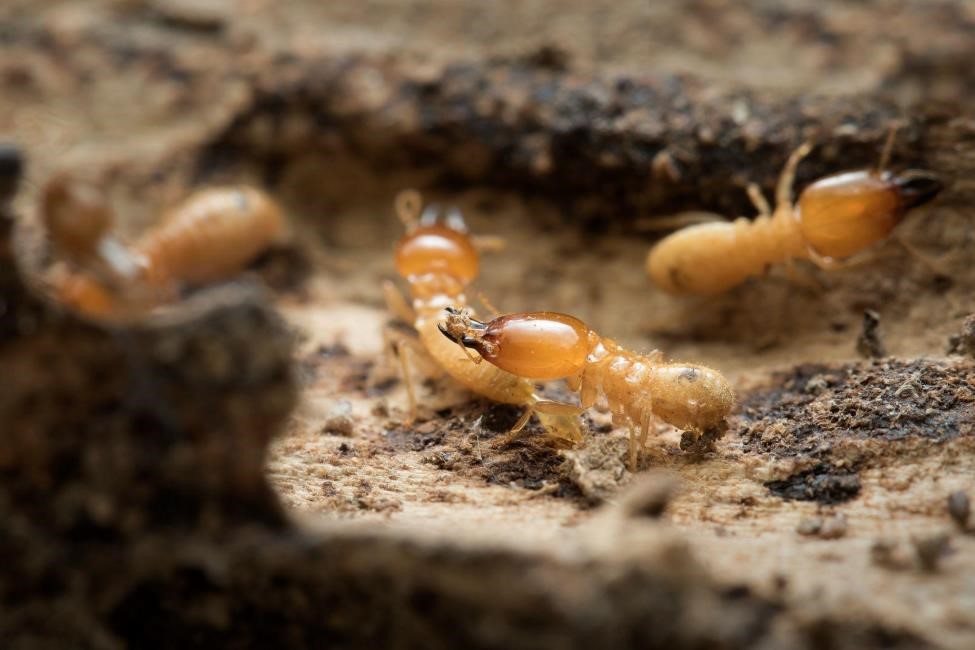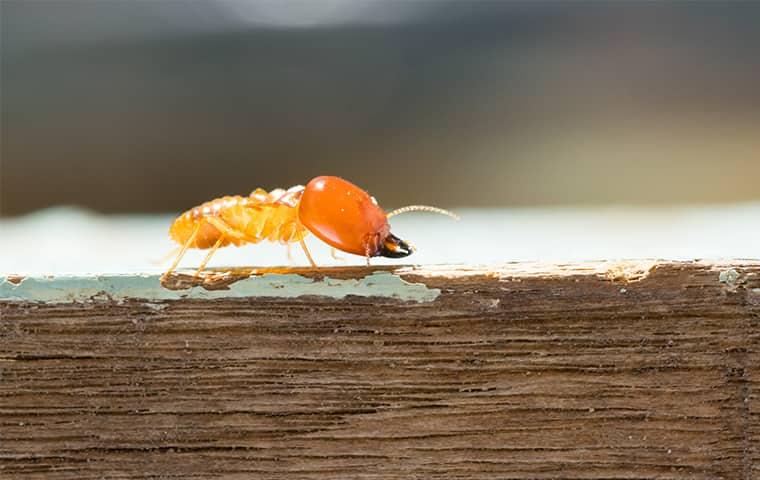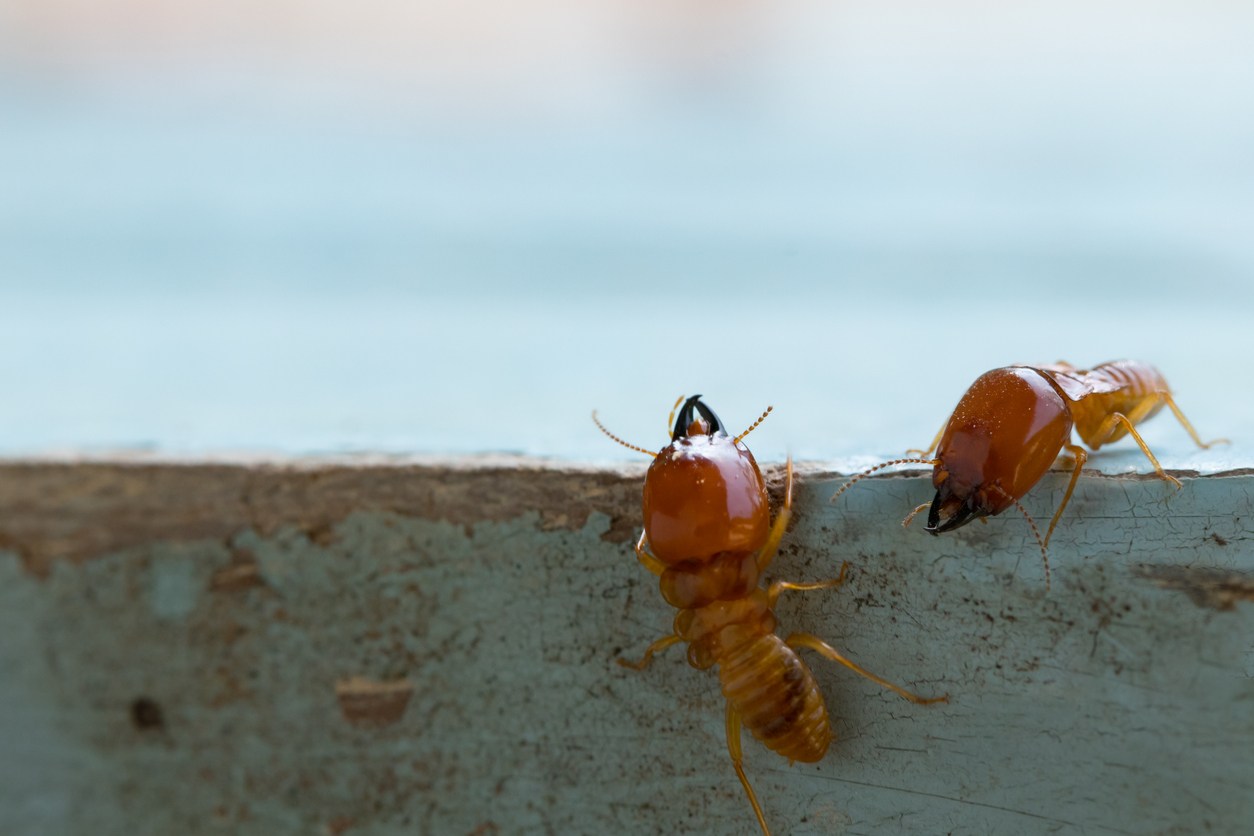Termites do not die in the winter; instead, they become less active and might retreat deeper into their nests to survive the cold, resuming activity when conditions are more favorable.
Some homeowners have a misconception that termite dies in winter. Therefore, they wait for the winter for the termites to die, but honestly speaking, it’s worthless.
However, the following reasons make the homeowner believe that the termites die in winter.
- Termites are less visible in winter, leading to the misconception that they die.
- Cold temperatures reduce termite activity, contributing to the belief.
- People observe fewer swarms or mud tubes during the winter.
- The lack of termite sightings reinforces the idea of winter mortality.
- Termites’ secretive nature fosters misconceptions about their winter survival.
- Misinformation and seasonal absence fuel the notion that termites die in winter.
Do Termites Die in The Winter: Winter Adaptation of Termites

As winter blankets the world in ice and snow, it’s easy to assume that nature’s smallest creatures, like termites, would simply perish in the cold.
But you might be surprised to learn that termites have some remarkable tricks up their tiny sleeves to brave the winter chill.
Here, I’ll unravel the secrets of termites’ survival during the coldest months. You’ll discover how these resilient insects beat the winter odds, from their impressive physiological adaptations to their clever behavioral changes and protective measures.
a. Withstanding Cold Temperatures through Physiological Adaptations:
Termites have mastered the art of staying warm when the world turns frigid. These little critters can regulate their body temperature, even in the midst of icy temperatures.
How do they do it? Termites huddle together in their nests like a cozy family around a fireplace. This communal warmth helps them endure the cold.
Moreover, termites possess special enzymes that break down cellulose, a tough substance found in wood. This digestion process generates heat, serving as their built-in heating system to survive chilly winters.
b. Modifying Behavior and Feeding Patterns:
Termites are not the same busy workers during winter as they are in warmer months. When winter strikes, they reduce their activity levels and slow their foraging.
This conserves energy and shields them from the biting cold. Termites also migrate deeper into their nests, getting closer to the warmth generated by their bustling colonies.
By staying put and conserving energy, they maximize their chances of making it through the winter.
c. Taking Protective Measures:
Termites aren’t just passive spectators of winter; they take proactive steps to ensure their survival. They build their nests underground or inside structures, creating a natural insulating shield against the cold.
These nests feature intricate tunnels and chambers that help termites move around without braving the harsh winter conditions.
Furthermore, termites stockpile food within their nests before winter arrives. This stored food provides a lifeline when foraging becomes scarce, helping them ride out the food shortages winter often brings.
Conclusion: Termites may be tiny, but they are far from helpless in the face of winter’s icy grip.
Through their remarkable physiological adaptations, altered behavior, and ingenious protective measures, termites defy the odds and emerge from winter’s embrace unscathed.
So, the next time you wonder about these resilient insects during the cold season, remember that even in the chilliest of times, termites have their own secrets to staying warm and thriving.
Termite Activity in Winter
Winter’s icy grip might make you think that termites vanish entirely during this chilly season.
However, the truth is far from what you might expect. In this section, we’ll unravel the mysteries of termite activity during winter, debunking the misconception that they disappear entirely.
a. Debunking the Disappearance Myth:
The common belief that termites vanish entirely during winter is a bit of a myth. While their activity does slow down significantly in colder regions, termites don’t simply disappear.
They continue to exist within their nests, adjusting their behavior to cope with the harsh conditions. These nests, often deep underground or inside structures, provide insulation and warmth, allowing termites to survive the cold months.
b. Persistence in Warmer Habitats:
Termites can remain active throughout the year in regions with milder winters or in heated homes. Warmer pockets of their habitat provide a haven where termites can thrive even during winter.
Heated homes, in particular, offer a cozy environment that keeps termites happily munching away on wood, completely unnoticed by homeowners.
c. Risks of Termite Infestations in Winter:
Termite infestations in winter can pose significant risks to your home and property. While termites are often associated with warmer months, they remain active year-round, and some species thrive in cold weather.
Here are some facts and key risks to consider even though it’s winter:
Year-Round Activity: Termites are active 24/7, 365 days a year. Even during winter, they continue to feed on wood and cellulose materials.
Species Variability: There are over 2,000 species of termites worldwide, and their behavior can vary. Some subterranean termite species, such as the Eastern Subterranean Termite, can forage for food even when the ground is cold and frozen.
Lower Reproductive Activity: In winter, termites don’t reproduce as often as in other seasons but don’t completely stop. One termite queen can lay thousands of eggs to maintain their population.
Slower Damage Accumulation: The rate of wood damage caused by termites may decrease in winter due to slower colony activity. However, they can continue to damage your home, and the damage may be less noticeable until it becomes severe.
Challenges in Detection: Winter termite activity can be harder to detect since homeowners may be less vigilant about pest control during the colder months. This can lead to delayed discovery of infestations.
Hidden Nests: Subterranean termites build their nests underground, protecting them from winter weather. This makes it challenging to locate and eliminate the source of the infestation.
Freezing Temperatures: Freezing temperatures can deter termite activity, but they can survive and remain active as long as they have access to a warm and moist environment within your home.
Increased Moisture Seekers: In winter, termites may be drawn to areas with higher moisture levels, such as basements and crawl spaces. This can exacerbate the risk of infestations in these parts of your home.
Delayed Detection: Because termites may go unnoticed during winter, infestations can grow undetected, causing significant structural damage by the time they are discovered.
Conclusion: So, do termites die in the winter? The answer depends on where they are and the conditions they face. Their activity slows down significantly in colder regions, but they don’t disappear entirely.
Termites can remain active year-round in warmer parts of their habitat, such as heated homes.
Protecting Your Home from Termites in Winter

Protecting your home from termites in winter is crucial. Here are some simple, numerical tips to help safeguard your property:
Regular Inspections: Conduct termite inspections at least once a year and consider professional inspections every 2-3 years.
Keep Moisture Levels Low: Keep indoor humidity below 50% to discourage termite activity.
Proper Ventilation: Ensure good ventilation in your home to prevent moisture buildup, especially in basements and crawl spaces.
Seal Cracks and Gaps: Seal any cracks or gaps in your home’s foundation and walls to prevent termite entry.
Distance Wood from Soil: Keep firewood, lumber, and wooden debris away from your home’s foundation; at least 20 inches is recommended.
Use Treated Wood: When building or renovating, use termite-resistant treated wood for construction.
Remove Dead Trees: Remove dead or decaying trees and stumps from your property as they attract termites.
Maintain Gutters: Ensure that gutters and downspouts direct water away from your home’s foundation.
Regularly Inspect Wooden Structures: Check wooden structures like decks, fences, and sheds for signs of termite damage.
FAQs
Can termites survive freezing temperatures in winter?
Yes, Termites can survive freezing temperatures in winter by retreating to insulated nest areas below the frost line.
Do termites hibernate during the winter months?
No, Termites do not hibernate during winter; their activity decreases due to colder temperatures.
How does winter affect termite colonies?
Winter can impact termite colonies by slowing their growth and feeding habits, as they conserve energy to endure the cold.
Can termites continue damaging structures in the winter?
Yes, termites continue damaging structures in the winter, although their activities slow down in winter.
When is the best time to treat termites during winter?
Treating termites in winter can be effective as they are less active. However, treatment timing should depend on local climate conditions and the specific termite species involved.
Do termites resume activity when winter ends?
Yes, termite activity increases as temperatures rise in spring, and they may swarm to establish new colonies.
Are there any signs of termite activity during the winter months?
Yes, there are signs of termite activity during the winter months, although it may be less noticeable; signs include mud tubes, damaged wood, and the presence of swarmers (winged termites).
Can I prevent termite infestations during the winter?
Yes, you can prevent termite infestations during the winter through proper home maintenance and regular inspections.
Should I wait until spring to address a termite problem?
No, you should not wait until spring to address a termite problem; acting promptly to prevent further damage regardless of the season is essential.
Conclusion
While termites are primarily active in warmer months, it is unlikely that they will die off completely during winter.
Termites have adaptations that help them survive in colder temperatures, such as building mud tunnels to regulate moisture and temperature. Some species may slow down their activities but can still remain active throughout the year, albeit at a slower pace.
It is important to note that termite activity can vary depending on the region and climate. Consulting a professional pest control service can provide accurate information and guidance regarding termite management in specific areas during winter months.

